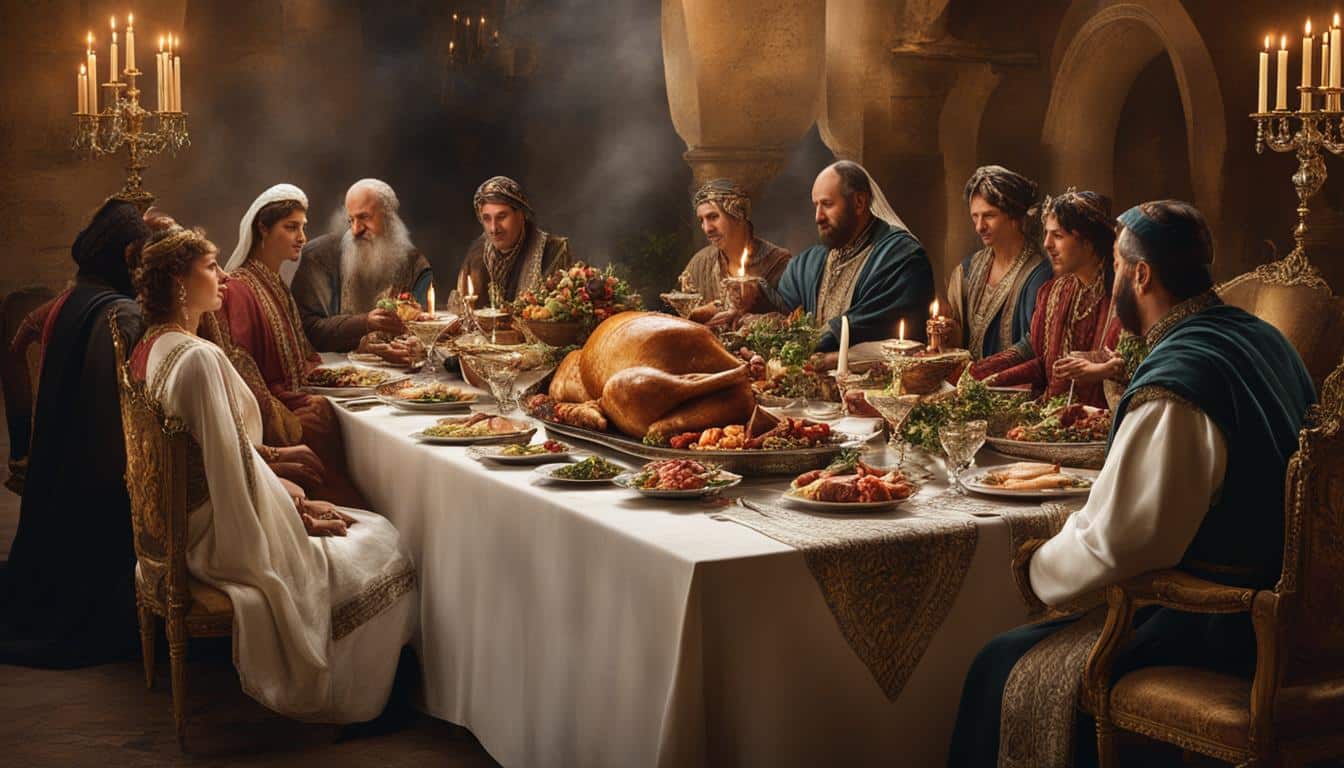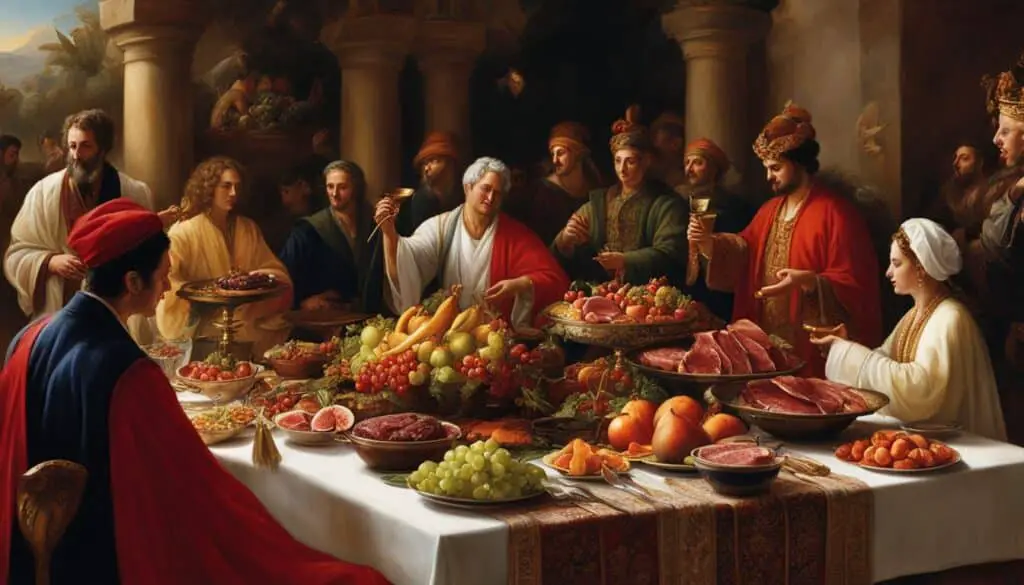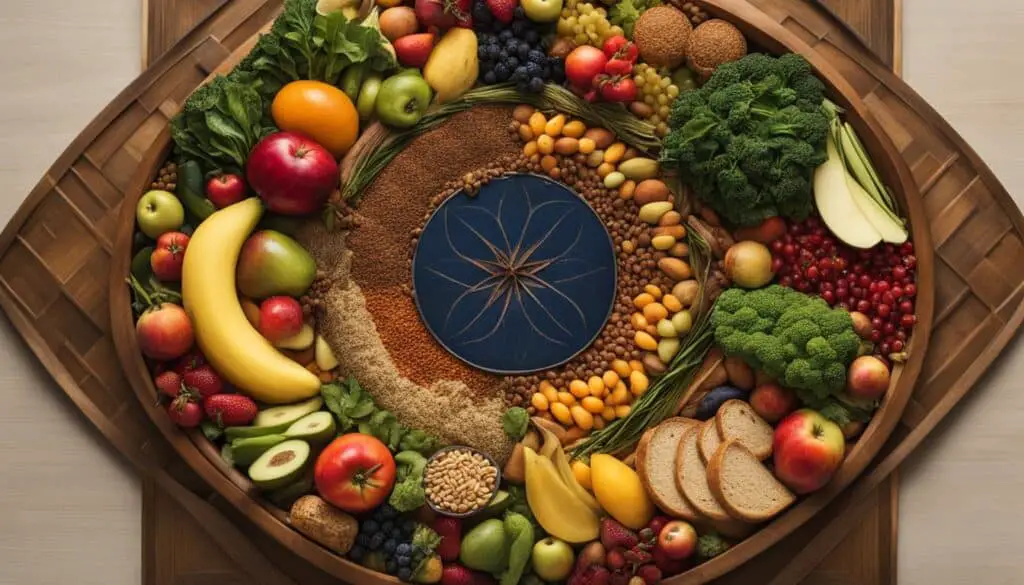
Join me, Margaret Feinberg, on an extraordinary culinary adventure as we explore the fascinating world of food and feasting in biblical stories. In this groundbreaking book, we will embark on a journey that takes us to various locations, from a salt mine to the Sea of Galilee, and even a California farm. Through this unique lens, we will delve into the customs, symbolism, and deeper meanings behind the meals mentioned in the Bible.
Throughout this exploration of biblical cuisine, we will unravel the significance of food and feasting in spiritual nourishment and community. We will discover the rich traditions that shaped biblical meals and understand how they played a vital role in ancient Israelite culture. By examining the culinary customs of the Bible, we will gain a deeper understanding of the spiritual impact of food in our lives today.
Key Takeaways:
- Food and feasting in biblical stories offer insights into cultural and spiritual significance.
- Biblical cuisine provides a window into the traditions and customs of ancient Israelite culture.
- Exploring food symbolism in the Bible can deepen our understanding of spiritual concepts and themes.
- Meals in biblical narratives reflect spiritual abundance, fellowship, and the goodness of God.
- The connection between food, faith, and the renewal of the body and soul is explored in the Bible.
A Taste of History: Culinary Customs in the Bible
In the Bible, food is not merely sustenance but a reflection of culture, history, and spirituality. Meals hold great significance in biblical narratives, providing opportunities for fellowship, celebration, and connection with God. Let’s explore the rich tapestry of culinary customs in the Bible, from feasts and banquets to symbolic meals that carry deep spiritual meaning.
One notable example of a feast in the Bible is the Last Supper, where Jesus gathered with his disciples to share a meal before his crucifixion. This meal, which included bread and wine, holds immense symbolic importance in Christian tradition, representing the body and blood of Christ. Similarly, the miraculous feeding of the multitudes showcases the abundance and provision of God, as Jesus fed thousands with just a few loaves of bread and fish.
In ancient Israel, feasting was a common practice for various occasions, from weddings to religious festivals. These feasts served as a way to celebrate, commemorate, and honor God. Each feast had its own set of customs and traditions, with specific foods and drinks playing a central role. For example, the Passover meal involved the consumption of unleavened bread and bitter herbs, symbolizing the haste and bitterness of the Israelites’ exodus from Egypt.
To fully grasp the significance of culinary customs in the Bible, it is essential to understand the dietary laws and traditions of the Israelites. These laws, outlined in the book of Leviticus, provided guidelines for what was considered clean and unclean food. The strict adherence to these dietary regulations served as a way for the Israelites to demonstrate their obedience to God and maintain their distinct identity as His chosen people.
Through the exploration of biblical meals and feasting customs, we gain a deeper understanding of the cultural and spiritual context in which these stories were written. Food in the Bible goes beyond mere nourishment—it serves as a tangible reminder of God’s presence, provision, and the shared experiences of His people.

Table: Examples of Culinary Customs in the Bible
| Feast | Significance |
|---|---|
| Last Supper | Symbolizes the body and blood of Christ in Christian tradition |
| Miraculous feeding of the multitudes | Reflects God’s abundance and provision |
| Passover | Commemorates the Israelites’ exodus from Egypt |
| Wedding feasts | Celebrate the union of two individuals and the start of a new family |
| Feasts of Tabernacles | Reminds the Israelites of their journey through the wilderness and God’s protection |
Nourishing Body and Soul: Food Symbolism in the Bible
Food in the Bible is not just about physical nourishment; it also carries profound spiritual symbolism. The biblical diet and the act of eating are often used to convey deeper meanings and spiritual truths. From the feasts and banquets that represent abundance and fellowship to the bread and wine that symbolize the body and blood of Christ, food plays a significant role in conveying God’s presence and provision.
One notable example of food symbolism in the Bible is the Passover meal, where the Israelites were instructed to eat unleavened bread and lamb as a reminder of their deliverance from slavery in Egypt. This meal not only commemorated a historical event but also pointed to the future sacrifice of Jesus Christ, who would become the ultimate Passover Lamb, offering redemption and freedom to all who believe.
Another instance of food symbolism is found in the story of Jesus feeding the five thousand with just five loaves of bread and two fish. This miraculous act not only satisfied the physical hunger of the crowd but also highlighted Jesus’ divine power and provision. The act of sharing food in this narrative emphasizes the importance of community, generosity, and trusting in God’s abundance.
The Symbolism of Banquets
In addition to individual meals, banquets are also used symbolically in the Bible. These grand feasts represent occasions of celebration, joy, and restoration. The banquet imagery is often associated with the Messianic age and the coming Kingdom of God, where there will be a rich feast for all who are invited. It signifies the ultimate fulfillment of spiritual longing and the fellowship enjoyed with God and others.
| Biblical Banquet | Symbolism |
|---|---|
| The Wedding Feast in Cana | Abundance and joy in the presence of Jesus |
| The Parable of the Prodigal Son | Restoration and reconciliation |
| The Marriage Supper of the Lamb | Final consummation of God’s kingdom |
These biblical banquets portray the satisfaction of deep spiritual hunger, the joy of being in God’s presence, and the unity of believers in the eternal kingdom. They remind us that our physical and spiritual nourishment comes from God, and that feasting is not merely about indulgence but also about experiencing the goodness and abundance of our Creator.

By exploring the food symbolism in the Bible, we can gain a deeper understanding of the spiritual truths conveyed through meals and banquets. It reminds us that food is not merely sustenance for the body, but a means through which God communicates His love, provision, and promises to His people.
Conclusion
Food and feasting hold a significant place in the stories of the Bible, shedding light on the cultural and spiritual importance of meals in ancient times. By delving into the culinary customs and symbolism of the Bible, we can gain a deeper understanding of the biblical narratives and the spiritual nourishment that food provides.
Throughout the pages of the Bible, humble meals shared among friends and grand feasts celebrated in the presence of God serve as reminders of His provision and presence. Whether it’s the bread and wine of the Eucharist symbolizing the body and blood of Christ or the abundance and fellowship represented by lavish banquets, food in the Bible carries profound spiritual meaning.
A culinary journey through the biblical texts allows us to explore the rich traditions and symbolism associated with biblical cuisine. From the Last Supper to the miraculous feeding of the multitudes, food plays a role in commemorating significant events and honoring God. It also serves as a source of spiritual renewal for the body and soul.
As we uncover the culinary customs and symbolism in the Bible, we discover that food not only nourishes our bodies but also feeds our spirits. Through the lens of food and feasting, we can embark on a spiritual exploration and gain a deeper appreciation for the cultural and spiritual significance of meals in biblical stories.
FAQ
What is the significance of food in the Bible?
Food plays a vital role in biblical stories, providing insights into cultural and spiritual significance, nourishment, and the presence of God.
How does this book explore the culinary customs in the Bible?
Join Margaret Feinberg on a remarkable journey as she uncovers the culinary customs and symbolism in the Bible, taking readers to places like a salt mine, the Sea of Galilee, and a California farm to delve into the meaning behind biblical meals.
What can I learn about feasts and celebrations in ancient Israel?
You will gain an understanding of the importance of feasts and celebrations in ancient Israel, how food was used to commemorate and honor God, and the rich tradition of biblical cuisine.
How does food symbolize spiritual concepts and themes in the Bible?
Certain foods and meals represent spiritual concepts and themes in the Bible, such as the bread and wine of the Eucharist symbolizing the body and blood of Christ.
What is the connection between food, faith, and the renewal of the body and soul?
Exploring the connection between food, faith, and the renewal of the body and soul allows us to delve deeper into the spiritual nourishment that food provides and its role in our spiritual well-being.
How does food in the Bible reflect spiritual abundance and fellowship?
Feasts and banquets in biblical narratives reflect spiritual abundance, fellowship, and the goodness of God, reminding us of the joy and celebration found in community gatherings and the provision of God.








